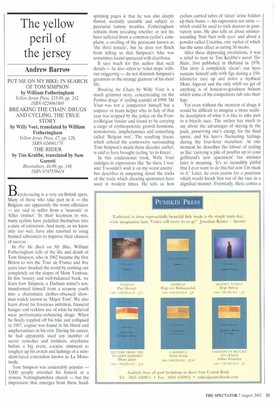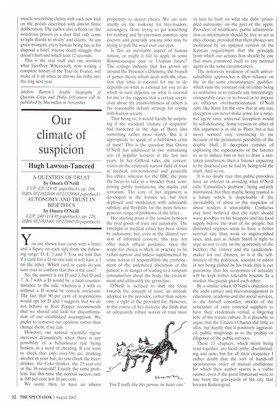The yellow peril of the jersey
Andrew Barrow
PUT ME ON MY BIKE: IN SEARCH OF TOM SIMPSON by William Fotheringham Yellow Jersey Press, £15.99, pp. 242, ISBN 0224061860 BREAKING THE CHAIN: DRUGS AND CYCLING, THE TRUE STORY by Willy Voet, translated by William Fotheringham Yellow Jersey Press. £7, pp. 128, ISBN 024061178 THE RIDER by Tim Krabbe, translated by Sam Garrett Bloomsbury. £6.99, pp. 148, ISBN 0747559414 Bicycle-racing is a very un-British sport. Many of those who take part in it — the Belgians are apparently the worst offenders — are said to suffer from a 'neurosis' or 'killer instinct'. In their keenness to win, many cyclists have pedalled themselves into a state of extinction. And many, as we know only too well, have also resorted to using banned substances to improve their chances of success.
In Put Me Back on My Bike, William Fotheringham tells of the life and death of Tom Simpson, who in 1962 became the first Briton to win the Tour de France and five years later shocked the world by conking out completely on the slopes of Mont Ventoux. In this bouncy and well-balanced book, we learn how Simpson, a Durham miner's son, transformed himself from a scrawny youth into a charismatic clothes-obsessed showman widely known as 'Major Tom'. We also learn about his ferocious ambition, financial hunger and reckless use of what he believed were performance-enhancing drugs. When he finally toppled off his bike and collapsed in 1967. cognac was found in his blood and amphetamines in his vest. During his career, he had apparently used any number of secret remedies and fortifiers, strychnine before a big event, cocaine ointment to toughen up his crotch and lashings of a stimulant-laced concoction known as La Moustarde.
Tom Simpson was undeniably popular — 5,000 people attended his funeral at a remote Nottinghamshire church — but the impression that emerges from these head spinning pages is that he was also deeply flawed, mentally unstable and subject to perennial tummy troubles. Fotheringham refrains from revealing whether or not his hero suffered from a common cyclist's complaint, a swelling of the perineum known as 'the third testicle', but he does not flinch from telling us that Simpson's bike was sometimes found spattered with diarrhoea.
It says much for this author that such details — he also refers to 'toilet stops' without sniggering — do not diminish Simpson's greatness or the strange glamour of his short life.
Breaking the Chain by Willy Voet is a much grimmer story, concentrating on the Festina drugs 'n' cycling scandal of 1998. Mr Voet was not a competitor himself but a soigneur or team helper who in July of that year was stopped by the police on the Franco-Belgian border and found to be carrying a cargo of erythroporetin, growth hormone, testosterone, amphetamines and something called 'Belgian mix'. The resulting fracas, which echoed the controversy surrounding Tom Simpson's death three decades earlier, is said to have brought cycling `to its knees'.
In this confessional book, Willy Voet indulges in expressions like 'So there I was' and 'I wouldn't wish it on my worst enemy', but describes in unsparing detail the tricks of the trade which cheating sportsmen have used in modern times. He tells us how cyclists carried tubes of 'clean' urine hidden up their bums — his expression not mine — which could be used to trick doctors in postvictory tests. He also tells us about sinistersounding 'fruit bars with eyes' and about a powder called Creatine, one sachet of which has the same effect as eating 30 steaks.
After these depressing revelations, it was a relief to turn to Tim Krabbe's novel The Rider, first published in Holland in 1978. This story is completely 'clean': our hero sustains himself only with figs during a 150kilometre race up and down a mythical Mont Aiguoul and the only whiff we get of anything is of honest-to-goodness balsam which some of his competitors rub into their legs.
Yet even without the mention of drugs it would be difficult to imagine a more realistic description of what it is like to take part in a bicycle race. The author has much to say about the advantages of staying in the pack, preserving one's energy for the final sprint, and his hero's fluctuating feelings during the four-hour marathon. At one moment he describes the labour of cycling as like 'carrying a pile of pouffes up to your girlfriend's new apartment' but minutes later is moaning, 'It's so incredibly pitiful that I ever want to do this but now I'm stuck in it.' Later, he even yearns for a puncture which would knock him out of the race in a dignified manner. Eventually, there comes a muscle-wrenching climax with each new kick on the pedals described with almost filmic deliberation. The author also reflects on the wondrous powers in a man that only come to light thanks to rivalry' and claims, 'At any given moment, every human being has at his disposal a brief, intense death struggle that doesn't hurt and which lasts 12 seconds.'
This is the real stuff and one wonders what Geoffrey Wheatcroft, now writing a complete history of the Tour de France, will make of it all when he throws his trilby into the ring next year.
Andrew Barrow's double biography of Quentin Crisp and Philip O'Connor will be published by Macmillan in November.



























































 Previous page
Previous page